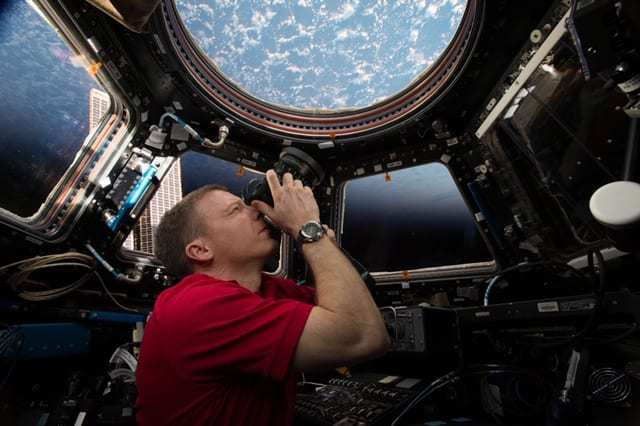
When now-retired NASA astronaut Col. Terry Virts used to go into space, isolation was an occupational hazard. The nature of space travel—being confined to tight areas with a select group of others—doesn’t really present any other options.
During one of Virts’ two spaceflights, however, this idea was taken to an extreme, when complications on the ground at a Russian space station—where a replacement crew was to take off—delayed his scheduled return home.
“We were just a few weeks away from getting to come back to Earth after having been in space for five months, and all of a sudden we’re stuck,” says Virts, a Baltimore native who grew up in Columbia. “It really kind of hit home that in space, I was faced with this sudden isolation.”
In some ways, that situation mirrors what people around the world are facing now in the midst of the coronavirus pandemic. Granted, the ground is under our feet, but the idea—being forced into a prolonged quarantine unexpectedly without a concrete end date in sight—is something Virts has experienced.
“Humans do well when they expect something to happen, and they don’t do well when they don’t expect something to happen,” Virts says. “As an astronaut, I was ready [for isolation]. I was expecting it and I was trained for it.”
To get a few tips on how to cope in a restrictive environment, we asked the 52-year-old Virts to share some of the wisdom he’s picked up during his illustrious career. Here are some of his suggestions:
Figure out what isolation means to you.
People define isolation in different ways, Virts says. But it’s important to set a baseline for what you’re comfortable with and ascribe to it.
“It really depends on the person,” Virts adds. “Humans are social creatures and we’re designed to be in groups. Some people are introverts. Other people want to be talking and interacting. For extroverts, just a little bit of cutting back on that is really painful. This is going to be tough psychologically. But you can also survive for longer and in tougher situations than you think you can.”
Address the situation and make the best of it.
When Virts and his fellow astronauts found out they were going to be delayed in their voyage home, they weren’t told how long it would be before they could return. Virts could have sulked, but he made an active decision to see the glass half full.
“We really didn’t know how long we were going to stay,” Virts says. “A lot of times astronauts get depressed or really bummed out, but my attitude was, ‘I’m stuck in space, but it’s going to end. I’m going to get back to Earth eventually. While I’m here, I’m going to take advantage of it and get some projects done that I didn’t have a chance to before.’ That attitude is the most important thing in situations when the unexpected happens—it happened, and there’s nothing I can do to change it. Now, let’s make the most of it.”
Take an active approach in handling monotony.
Many of us are working from home in the same space and, in following social distancing guidelines, not leaving our residences unless we have to. This can make days feel a bit repetitive. As an astronaut, Virts knows all about that: “I get [monotony],” he says. “I was in the same can for 200 days. So I understand that.”
Virts suggests adding tweaks to your day-to-day routine to avoid making life feel like Groundhog Day. “A little bit of variety goes a long way,” he says. “Try to do mornings in the bedroom and afternoons in the living room, and go for a walk at a certain time of day. Set your alarm to have a certain routine, but vary that routine—don’t do the same thing every day. Even if it’s simple things like changing the time of day you exercise or the order of things you do. You should have a basic schedule, but vary it up.”
Be mindful of others.
Virts was once the commander of the International Space Station, where it was his responsibility to monitor morale and take the temperature of his crew to see how they were faring. That meant being aware of what they needed in certain situations, and discerning how best to give it to them.
In the midst of coronavirus, though you might be adjusting and adapting well to this new normal, it’s important to consider how it might be affecting friends, family, and colleagues.
“This situation requires some emotional intelligence,” Virts says. “You have to understand if someone is feeling lonely. If they are, reach out to them and call them and play a game or Skype or whatever works for them.”
Virts also says that, as important as it is to recognize when someone needs a hand, it’s equally important to know when they want time to themselves.
“On the International Space Station, people needed time alone sometimes,” he says. “Carve out personal space for people and let them have it and respect it. A mix of yourself and connection with other folks is a good thing.”
Decide how to be alone.
Virts believes that, throughout this time, people can be strong and cope with these extreme circumstances. But that doesn’t mean that there aren’t times when living in quarantine can feel limiting. It’s important to strike a healthy balance.
“You can go without much more than you think you can,” Virts says. “But connect with people if you can. You can’t be with someone physically, but you can reach out to them in some way. Make lemonade when you’re given lemons.”